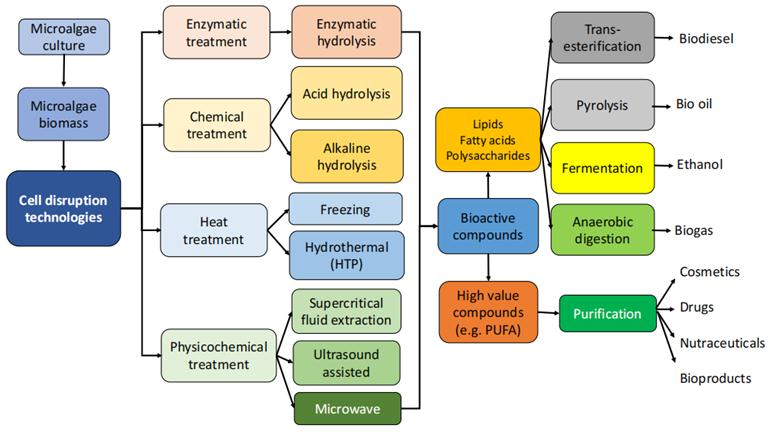The shortage of non-renewable petroleum resources and their impact on the environment requires the development of renewable and biodegradable green materials, including bioplastics, biopolymers, and biocomposites. Microalgae have attracted great interest in manufacturing biomaterials with unique functions and extraordinary applications due to their large yield, short growth time, and variable culture conditions. Microalgae have proven to be an excellent alternative for producing green materials such as microalgae polymers, co-blends, and combinations of biomass or microalgae biomolecules with other polymeric materials. Microalgae-based biopolymers have better mechanical properties than petroleum-based polymers and can be modified by adding plasticizers, additives, and bulking agents to improve their durability, strength, and flexibility.
 Fig 1. Key biorefinery processes for algal cell disruption, processing, and product recovery. (Orejuela-Escobar L, et al., 2021)
Fig 1. Key biorefinery processes for algal cell disruption, processing, and product recovery. (Orejuela-Escobar L, et al., 2021)
Microalgae-based biomaterials are interesting competitors to replace existing non-renewable polymeric materials derived from fossil fuels. Lifeasible has extensive experience synthesizing microalgae materials; we successfully established a unique microalgae green materials R&D center to process microalgae and microalgae biomass into biomaterials for a wide range of applications.
We are proud to offer our customers customized and comprehensive solutions for biomaterial applications of microalgae, including but not limited to the following:
We offer a wide range of algal polymers such as agar, carrageenan, alginate, and polyhydroxyalkanoates. In addition, our skilled scientists can quickly help you develop green biomaterials by blending microalgae and biomass polymers with low-cost macromolecules such as natural fibers, proteins, and starches. Our microalgae-based biomaterials have the following characteristics.
Our microalgae biomaterials are used by our customers in a wide range of applications, including environmental remediation, biorefining, and biomedicine, etc. Our customer service representatives are enthusiastic and trustworthy 24 hours a day, 7 days a week. If you are interested in our services, please feel free to contact us for more information or to discuss in detail.
Reference